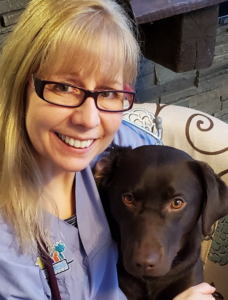Certified service dog coach Dr. Colleen Fisher holds degrees in veterinary medicine and clinical animal behavior, and she is a CDBC. She has a particular interest in working dogs and psychiatric service dogs. Colleen helps pet dog owners and service dog partners with their dogs’ behavior through her practice, Fisher Animal Behaviour Services, in Manitoba, Canada.
Can you tell us a little about your background?
I graduated from the Western College of Veterinary Medicine in Saskatoon, Saskatchewan, in 1990 and returned to my hometown of Winnipeg, Manitoba, to practice companion animal medicine. I performed behaviour consults within my clinical practice for many years. I felt like I was missing out on a piece of the therapy puzzle, because I was not comfortable with incorporating a training component into my plans. In 2019, I completed a Master of Science in Clinical Animal Behaviour from the University of Edinburgh Royal (Dick) School of Veterinary Studies. I am a member of the American Veterinary Society of Animal Behavior and the International Association of Animal Behavior Consultants, and am Fear Free™ Elite certified. I strongly believe that our understanding of animal behaviour and welfare is the foundation for best practices and successful outcomes in veterinary medicine. Because my husband is allergic to cats, I’m always on the lookout for the next best (Fear Free!) kitty snuggles during in-home consultations.
What made you interested in service dogs?
In 1997, I started working with the Winnipeg Police Services Canine Unit as their primary care veterinarian. I was able to observe their training practices and see the incredible relationships that were built between human and canine partners. Over the next couple of decades, I was able to work with the Royal Canadian Mounted Police, Canadian Border Services, and a number of corrections and detector dog organizations as well as individual guide and service dogs. I moved from Winnipeg to Brandon in 2014. Because we are near a military base, I met a number of psychiatric service dogs for active and retired service members with PTSD and other occupational stress injuries as part of my veterinary practice. While some of these dogs appeared professionally well-trained, I also observed a number that showed incredible stress in the public space; I worked on a casual basis with these teams to determine if behaviour modification techniques could facilitate improvement in their overall emotional welfare.
You have done research on psychiatric service dogs and their handlers. Can you tell us about this and what you learned?
As part of my MSc dissertation, I performed a project where we surveyed psychiatric service dog owner-handlers regarding their ability to recognize emotions in their canine partners. We used search and rescue dog handlers as our control group, and they were asked to complete the same survey. We found that both groups were able to identify obvious body language indicators of positive (happy) and negative (fearful) emotional states. The psychiatric service dog owner-handlers had some challenges identifying stress indicators. There were also some indications that both handler groups may overlook canine stress during work situations where they needed their dog to perform specific tasks.
What are some implications of the findings in your study for service dog trainers?
Service dog handlers of all varieties need core training in canine learning theory and recognition of body language indicators related to emotional states. Their dog’s emotional welfare needs to be taken into account not just during training but throughout the dog’s working life.
What motivated you to enroll in the SDC course?
I like to do things well. I have had success with my behaviour practice, working with pet dogs and cats. I wanted to be able to take the next steps with coaching service dog owner-handlers, both those who have graduated from other programs and those who have been self-taught.
What did you like the most about the SDC course?
Veronica has a wealth of knowledge and experience to draw from when it comes to both training service dogs (and their people!) and the relationship-building required between health professionals to help these teams be successful.
I really appreciate what a wonderful group of professionals Veronica has brought together through the SDC program. I learned so much with every course post and the Facebook graduates discussion group.
Can you tell us about the work you are doing now (or plan to do) with service dogs?
I have trained our 2-year-old chocolate Labrador, Romi, with many of the tasks required to be a psychiatric service dog. I have been concentrating on my veterinary behaviour practice until now, but I’m hoping that I will be able to start a service dog training program over the next year or so. I presently have two potential service dog training clients interested. For me, it’s all about starting slowly and building success.
What advice would you give to trainers thinking about getting involved in service dog training?
Trainers need to want to work with people of different abilities and different ways of learning. We are great with the dogs and have to remember that some of what we train does not come easily to our potential clients. Simple things like identifying the steps in building a task and timing of reward can be challenging. And, because it’s my love, teaching our clients how to recognize their dog’s emotional welfare and still be okay with having “retreat” plans during times of canine stress should be a huge part of any lesson schedule.

